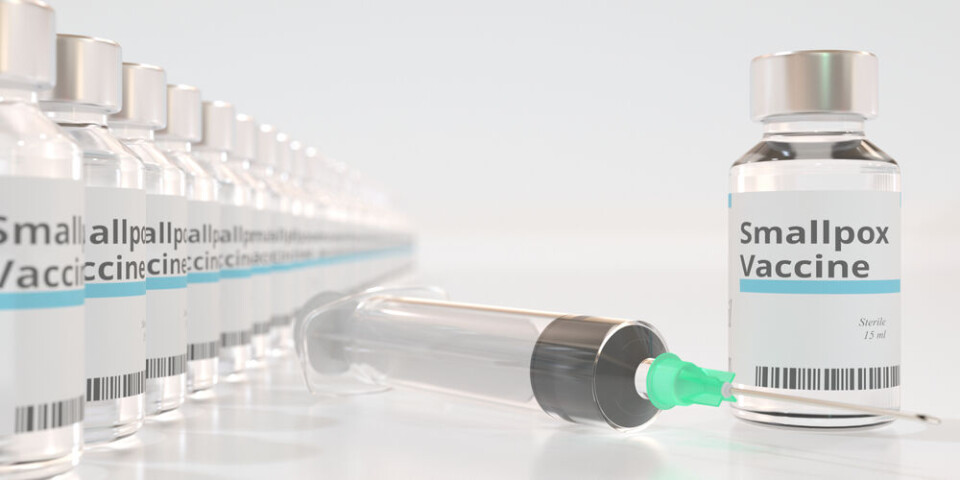-
VPN providers may leave France under pressure from Canal+
The broadcaster is demanding courts order Virtual Private Networks to block access to illegal streams
-
Forgetting luggage on French transport can land you a hefty fine
Fines vary from €72 to €1,500 depending on the level of offence, with 360 items left per week
-
Death of Emile, 2: French prosecutor gives more details after grandparents released
There are several reasons that a third party is suspected of involvement in Emile’s death
A case of monkeypox virus reported in Paris area, the first in France
The illness causes similar but less severe symptoms to smallpox. Older people vaccinated against smallpox are thought to have some immunity

A case of monkeypox (variole du singe) virus has been reported in the Paris area, a first declared case in France.
The disease causes similar but less severe symptoms to smallpox, a disease considered to have ‘disappeared’ globally in 1980 due to improved healthcare and vaccination. Smallpox was common from the 1800s to the 20th century and is estimated to have killed hundreds of millions and blinded many more.
The case in Ile-de-France was confirmed by health authority la direction générale de la santé (DGS) yesterday, May 19.
Monkeypox is today usually found only in certain regions of Africa. It is called monkeypox because it was first identified in laboratory monkeys.
However, in recent weeks, monkeypox has been reported in Europe and the US. More than 30 cases have so far been confirmed in Spain (eight cases), Portugal (20), the UK (nine), Italy (one confirmed, two suspected), Sweden, and the US (one each), and Canada (12), their respective health authorities have said.
The first European case was reported on May 7 in a person who had returned to the UK from Nigeria, where the illness is common.
Symptoms include fever, intense headaches, muscular pain, lymph node inflammation, backache, and severe fatigue. Then, the ‘pox’ spots appear - firstly on the face, then the palms of the hands, and the soles of the feet.
The mouth, genitals, and even the corneas can also be affected by the rash. Symptoms generally take two or three weeks to dissipate, the WHO says.
The illness is usually spread through infected rodents or primates, or infection through contact with their blood, bodily fluids, skin, or lesions. Consuming undercooked meat of infected animals also presents a risk.
Human-to-human spread is usually through respiratory particles through prolonged face-to-face contact. It can also come from contact of lesions and bodily fluids of infected people.
Does France have a vaccine?
One way to tackle the spread would be to use the ‘old’ type of smallpox vaccine, which has been rarely used for years due to the illness having been declared no longer in circulation.
Smallpox vaccination has not been obligatory in France since 1979, and boosters have no longer been mandatory since 1984. However, the country does have a ‘national plan’ designed to offer a response to another outbreak of the illness, which was established in 2006.
Professor Antoine Flahault, epidemiologist and director of the Institute of Global Health (ISG) at the University of Geneva, today told FranceInfo: “People aged older than 52 who have been vaccinated against smallpox may have some immunity because these are very similar viruses.
“Those who were vaccinated are therefore probably protected, especially against severe forms, and maybe even clinical forms, of the illness.”
How is Europe tackling the illness?
The European Centre for Disease Control (ECDC) is now recommending vaccines for vulnerable people against the illness.
Spain has already ordered thousands of vaccines after taking advice from specialists, it was reported yesterday. Gay men having sexual relations with other men are especially at risk of contracting the disease, the Catalan newspaper La Vanguardia reports.
This was also confirmed by Professor Flauhault, who said: “There seems to be a sexual contamination between male to male, which is not at all usually seen with this illness.”
There is not currently a vaccine available that works specifically against monkeypox, so Spain has ordered the ‘Imvanex’ vaccine, which is made by Danish lab Bavarian Nordic and targets smallpox. Vaccines are still made to protect certain people, such as researchers who work with the virus.
The vaccine will reduce the severity of symptoms in those infected, and offers up to 85% better protection against infection than no vaccine, the WHO and l’Institut Pasteur report.
Britain is also offering a smallpox shot to some healthcare workers and others who may have been exposed, Reuters reports.
Jimmy Whitworth, professor of international public health at the London School of Hygiene and Tropical Medicine, told Reuters: "This isn't going to cause a nationwide epidemic like Covid did but it is a serious outbreak of a serious disease – and we should take it seriously."
Dr Colin Brown, Director of Clinical and Emerging Infections at the UK Health Security Agency (Ukhsa), said: “It is important to emphasise that monkeypox is not easily transmitted between people and that the overall risk to the general public is very low.”
Professor Flahault added: “We must certainly be very careful with monkeypox, but it has no similarity to the Covid-19 [situation] at the moment. It’s a DNA virus, and quite stable, which does not mutate much.”
The UK registered the ‘last’ smallpox death in the world in 1978; 40-year-old Janet Parker, who worked as a photographer at Birmingham Medical School, where the disease was being researched in a laboratory.
Before that, the ‘last’ worldwide case had been declared in Somalia in 1977, and the UK had not seen a case for five years prior to the diagnosis of Mrs Parker.
The last known epidemic in France was in the winter of 1954-1955 in Vannes (Brittany). It infected 73 people and killed 16.
Related articles
Scientists revive ancient virus
Pasteur, France's first media scientist
France's mistrust of vaccination 'putting us at risk'
























